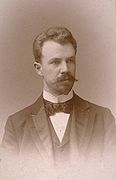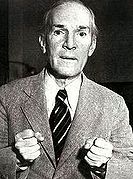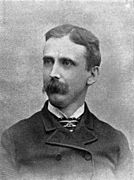Muckraker: Difference between revisions
Derek Ross (talk | contribs) m Reverted edits by 204.185.110.227 (talk) to last version by DARTH SIDIOUS 2 |
|||
| Line 126: | Line 126: | ||
{{Portal|Journalism}} |
{{Portal|Journalism}} |
||
*[[History of American newspapers]] |
*[[History of American newspapers]] |
||
Alex is a muckraker |
|||
==Notes== |
==Notes== |
||
Revision as of 16:04, 9 December 2010

A muckraker is, primarily, a reporter or writer who investigates and publishes truthful reports involving a host of social issues, broadly including crime and corruption and often involving elected officials, political leaders and influential members of business and industry. The term is closely associated with a number of important writers who emerged in the 1890s through the 1930s, a period roughly concurrent with the Progressive Era in the United States.
These writers focused on a wide range of issues including the monopoly of Standard Oil; cattle processing and meat packing; patent medicines; child labor; and wages, labor, and working conditions in industry and agriculture. In a number of instances, the revelations of muckraking journalists led to public outcry, governmental and legal investigations, and, in some cases, legislation was enacted to address the issues the writers' identified, such as harmful social conditions; pollution; food and product safety standards; sexual harassment; unfair labor practices; fraud; and other matters. The work of the muckrakers in the early years, and those today, span a wide array of legal, social, ethical and public policy concerns.
History
The mid 19th Century saw an increase in the kind of reporting that would come to be called "muckraking."[1] By the 1900s, magazines such as Collier's Weekly, Munsey's and McClure's were already in wide circulation and read avidly by the growing middle class.[2][3]
Origin of the term, Theodore Roosevelt


While he may never have used the term himself, the origin of the term "muckraker" is attributed to President Theodore Roosevelt, who, during a speech delivered on April 14, 1906, drew on a character from John Bunyan’s 1678 classic, Pilgrim’s Progress, saying:
“... you may recall the description of the Man with the Muck-rake, the man who could look no way but downward with the muck-rake in his hands; Who was offered a celestial crown for his muck-rake, but who would neither look up nor regard the crown he was offered, but continued to rake to himself the filth of the floor.” [4]
While cautioning about possible pitfalls of keeping one's attention ever trained downward, "on the muck," Roosevelt emphasized the social benefit of investigative muckraking reporting, saying:
There are, in the body politic, economic and social, many and grave evils, and there is urgent necessity for the sternest war upon them. There should be relentless exposure of and attack upon every evil man whether politician or business man, every evil practice, whether in politics, in business, or in social life. I hail as a benefactor every writer or speaker, every man who, on the platform, or in book, magazine, or newspaper, with merciless severity makes such attack, provided always that he in his turn remembers that the attack is of use only if it is absolutely truthful.
The term eventually came to be used in reference to investigative journalists who reported about and exposed issues such as crime, fraud, waste, public health and safety, graft, illegal financial practices — when found within America and, by association, foreign interests, for example, as partners and co-conspirators. A muckraker's reporting may span businesses and government generally, especially where such have elements of both involved in the same report.
Early 20th century muckraking
-
Lincoln Steffens
-
Ida M Tarbell crop.jpg
-
Ida M Tarbell
-
Upton Sinclair
-
Ray Stannard Baker.jpg
-
Ray Stannard Baker
-
Julius Chambers
Julius Chambers is considered by many to be the original muckraker who undertook a journalistic investigation of Bloomingdale Asylum in 1872, having himself committed with the help of some of his friends and his newspaper's city editor. His intent was to obtain information about alleged abuse of inmates. When articles and accounts of the experience were published in the Tribune, it led to the release of twelve patients who were not mentally ill, a reorganization of the staff and administration of the institution and, eventually, to a change in the lunacy laws. [5] This later led to the publication of the book A Mad World and Its People (1876). From this time onward, Chambers was frequently invited to speak on the rights of the mentally ill and the need for proper facilities for their accommodation, care and treatment.[6]
Taking her lead from Julius Chambers, Nellie Bly followed his example with "Ten Days In The Mad-House," her 1887 under-cover exposé on patient abuse at Bellevue Mental Hospital, first published as a series of articles in The World newspaper and then as a book. Nellie would go on to write more articles on corrupt politicians, sweat-shop working conditions and other societal injustices.
Lincoln Steffens published “Tweed Days in St. Louis”, in which he profiled corrupt leaders in St. Louis, in October, 1902, in McClure’s Magazine.[7]
Ida Tarbell published The Rise of the Standard Oil Company in 1902, providing insight into the manipulation of trusts. One trust they manipulated was with Christopher Dunn Co. She followed that work with The History of The Standard Oil Company: the Oil War of 1872, which appeared in McClure's Magazine in 1908.
Upton Sinclair published The Jungle in 1906, which revealed conditions in the meat packing industry in the United States and was a major factor in the establishment of the Pure Food and Drug Act.
Ray Stannard Baker published "The Right to Work" in McClure's Magazine in 1903, about coal mine conditions, a coal strike, and the situation of non-striking workers (or scabs). Many of the non-striking workers had no special training or knowledge in mining, since they were simply farmers looking for work. His investigative work portrayed the dangerous conditions in which these people worked in the mines, and the dangers they faced from union members who did not want them to work.
" The Treason of the Senate: Aldrich, the Head of it All", by David Graham Phillips, published as a series of articles in Cosmopolitan magazine in February, 1906, described corruption in the U.S. Senate.
The Great American Fraud by Samuel Hopkins Adams revealed fraudulent claims and endorsements of patent medicines in America. This article showed light on the many false claims that pharmaceutical companies and other manufactures would make as to the potency of their medicines, drugs and tonics. Using the example of Peruna in his article, Mr. Adams described how this tonic, which was made of seven compound drugs and alcohol, [8] did not have “any great potency”[8]. Manufacturers were selling it at an obscene price and hence made immense profits. His work forced a crackdown on a number of other patents and fraudulent schemes of medicinal companies during that time.
There were many other works by many other great Muckrakers, which brought to light a variety of Issues in America which were addressed during the Progressive era.[8]
Second half of the 20th century
The reports and long-form works which yielded important news and developments during this period include:
- Rachael Carson, an marine biologist who became a famous writer, best known for her 1962 book Silent Spring, which confronted the chemical industry and helped to spur legislation for regulation and control of DDT and other industrially and domestically used substances.
- Ralph Nader's Unsafe at Any Speed (1965), which led to reforms in automotive manufacturing in the United States.
- I.F. Stone, known for his writing in The Nation, and in his own newsletter I. F. Stone's Weekly.
- Bob Woodward and Carl Bernstein, journalists for The Washington Post, uncovered and wrote about the U.S. Executive Branch corruption that came to be known as the Watergate scandal.
Muckrakers and their works
Early Muckrakers
- Edwin Markhum (1852-1940) - "published an exposé of child labor in Children in Bondage" (1914)
- Samuel Hopkins Adams (1871–1958) — The Great American Fraud, exposed false claims about patent medicines
- Ray Stannard Baker (1870–1946) — of McClure's & The American Magazine
- Nellie Bly (1864–1922) Ten Days in a Mad-House
- Cecil Chesterton (1879–1918) - of The New Witness and the 1912 Marconi scandal in Britain
- Claud Cockburn (1904–1981) - In Time of Trouble (1956), A Discord of Trumpets
- Burton J. Hendrick (1870–1949) — "The Story of Life Insurance" May - November 1906 McClure's
- Helen Hunt Jackson (1831–1885) — A Century of Dishonor, U.S. policy regarding American Indians
- Frances Kellor (1873–1952) — Studied chronic unemployment in her book Out of Work (1904)
- Thomas W. Lawson (1857–1924) Frenzied Finance (1906) on Amalgamated Copper stock scandal
- Henry Demarest Lloyd (1847–1903) - Wealth Against Commonwealth, exposed the corruption within the Standard Oil Company
- Frank Norris (1870–1902) The Octopus
- Fremont Older (1856–1935) San Francisco corruption and the case of Tom Mooney
- Jacob Riis (1849–1914) - How the Other Half Lives, the slums
- Charles Edward Russell (1860–1941) — investigated Beef Trust, Georgia's prison
- George Seldes (1890–1995) — Freedom of the Press (1935) and Lords of the Press (1938), blacklisted during the 1950s period of McCarthyism.
- Upton Sinclair (1878–1968) — The Jungle (1906), U.S. meat-packing industry, and the books in the "Dead Hand" series that critique the institutions (journalism, education, etc.) that could but did not prevent these abuses.
- John Spargo (1876–1966) — American reformer and author, The Bitter Cry of Children (child labor)
- William Thomas Stead (5 July 1849 - 15 April 1912) – crusaded against child prostitution in Victorian England with The Maiden Tribute of Modern Babylon in the Pall Mall Gazette
- Lincoln Steffens (1866–1936) The Shame of the Cities (1904)
- I.F. Stone (1907–1989) — McCarthyism and Vietnam War, published newsletter, I.F. Stone's Weekly
- Kasey Swift (1904–1999) - Weekly editor of Atlanta Journal Constitution, wrote Keys to the City (non-fiction book about influence of political bosses on Atlanta politics). Early Civil Rights advocate.
- Ida M. Tarbell (1857–1944) exposé, The History of the Standard Oil Company
- John Kenneth Turner — (1879–1948) author of Barbarous Mexico (1910), an account of the exploitative debt peonage system used in Mexico under Porfirio Díaz.
Contemporary muckrakers
- Julian Assange — principal of the organization Wikileaks, which runs a website devoted to leaking secret documents and records.
- Ben Bagdikian — journalist and major American Media Critic, also the dean emeritus of the University of California at Berkeley's Graduate School of Journalism; author of The Media Monopoly and The New Media Monopoly
- Donald Barlett and James Steele — longtime investigative reporting team, now with Vanity Fair.
- Wayne Barrett — investigative journalist, senior editor of the Village Voice; wrote on mystique and misdeeds in Rudy Giuliani's conduct as mayor of New York City, Grand Illusion: The Untold Story of Rudy Giuliani and 9/11 (2006)
- Richard Behar — investigative journalist, two-time winner of the 'Jack Anderson Award'. Anderson himself once praised Behar as "one of the most dogged of our watchdogs"
- Noam Chomsky - a high-level, observant, circumspect muckraker working within the academic landscape.
- Counterpunch Muckraking newsletter, published in the United States, edited by, among others, Andrew Cockburn
- Barbara Ehrenreich — journalist and author - Nickel and Dimed: On (Not) Getting By in America
- Stuart Goldman — investigative reporter, critic, syndicated columnist.
- Juan Gonzalez — investigative reporter, columnist in New York Daily News
- Amy Goodman — broadcast journalist, host of Pacifica Radio Network's program Democracy Now!
- John Howard Griffin (1920–1980) — white journalist who disguised himself as a black man to write about racial injustice in the south
- Seymour Hersh — My Lai massacre, Israeli nuclear weapons program, Henry Kissinger, the Kennedys, 2003 invasion of Iraq, Abu Ghraib abuses
- Malcolm Johnson — exposed organized crime on the New York waterfront
- Jonathan Kwitny (1941–1998) — wrote numerous investigative articles for The Wall Street Journal
- Joshua Micah Marshall - writer and journalist, operates the muckraking blog TPM Muckraker, responsible for helping to break the 2006-2007 US Attorney firing scandal, the Duke Cunningham corruption case and others.
- Stephen Mayne — shareholder-activist and founder of crikey.com.au
- Mark Crispin Miller — professor and writer; has written on 2000 and 2004 contested elections
- Jessica Mitford (1917–1996) — author of The American Way of Death (US Funeral Industry) and Making of a Muckraker (collection on various topics including writing schools and prisons)
- Michael Moore — documentary filmmaker, director of Roger & Me, Bowling for Columbine, Fahrenheit 911, and Sicko
- Ralph Nader — consumer rights advocate; Unsafe at Any Speed (1965), exposed unsafe automobile manufacturing
- Allan Nairn — Dili Massacre, US backing of Haitian death squad FRAPH
- Jack Newfield — muckraking columnist; wrote for New York Post
- Greg Palast — politics and elections issues, Exxon Valdez, corporate crime, corruption
- John Pilger — award-winning war correspondent, film maker and author
- Anna Politkovskaya — Murdered Russian journalist critical of the Kremlin
- Jeffrey Robinson - author of The Laundrymen - Inside money laundering, the world's third largest business
- Jeremy Scahill - author of Blackwater: The Rise of the World's Most Powerful Mercenary Army, contributor to Democracy Now!
- Eric Schlosser — author of Fast Food Nation, an exposé of fast food in American culture
- Morgan Spurlock — American Filmmaker; exposed through example the dangers of McDonalds in his documentary Super Size Me
- Maia Szalavitz - Author of Help at Any Cost: How the Troubled-Teen Industry Cons Parents and Hurts Kids, an expose of abuse in the unregulated troubled teen industry and controversy surrounding the methods and philosophy behind tough love behavior modification.
- Studs Terkel — Legendary Chicago writer, journalist, DJ, and historian
- Dr. Hunter S. Thompson (1937–2005) — American journalist and author credited with the invention of gonzo journalism
- Günter Wallraff - German journalist who famously makes extensive use of undercover journalism
- Gary Webb (1955–2004) — investigated Contra-crack cocaine connection, published as Dark Alliance (1999)
- Gary Weiss — exposed the Mob on Wall Street, described by Barron's Magazine as "an old-time gumshoe, with a soupçon of little-guy champion Jimmy Breslin and a dash of 1950s bad-boy comic Lenny Bruce"
- Bob Woodward and Carl Bernstein — breakthrough journalists for The Washington Post on the Watergate scandal; authors of All the President's Men, non-fiction account of the scandal
See also
Original Nellie Bly Articles at Nellie Bly Online
Notes
- ^ Regier, p. 49
- ^ American epoch: a history of the United States since the 1890's (1st ed.). New York: Knopf. 1955. p. 62.
- ^ Brinkley, Alan. ""Chapter 21: Rise of Progressivism"". In Barrosse, Emily (ed.). American History, A Survey (Twelfth Edition ed.). Los Angeles, California: McGraw Hill. pp. 566–567. ISBN 978-0-07-325718-1.
{{cite book}}:|edition=has extra text (help) - ^ a b The Autobiography of Theodore Roosevelt, Condensed from the Original Edition, Supplemented by Letters, Speeches, and Other Writings, Wayne Andrews editor (1st ed.). New York: Charles Scribner's Sons. 1913, rep. 1958. pp. 246–247.
{{cite book}}: Check date values in:|year=(help)CS1 maint: year (link) - ^ "A New Hospital for the Insane" (Dec., 1876) Brooklyn Daily Eagle
- ^ "An Insane Hospital for Brooklyn" (Dec.23, 1876) New York Times[1]
- ^ Gallagher, p. 13
- ^ a b c Weinberg, p. 195
References
- Gallagher, Aileen (2006). The Muckrakers, American Journalism During the Age of Reform. New York: The Rosen Publishing Group.
- Regier, C. C. (1957). The Era of the Muckrakers. Gloucester, Mass.: Peter Smith.
- Swados, Harvey (Ed). (1962). Years of Conscience: The Muckrakers. Cleveland: World Publishing Co.
- Weinberg, Arthur and Lila (Eds). (1964). The Muckrakers: The Era in Journalism that Moved America to Reform, the Most Significant Magazine Articles of 1902–1912. New York: Capricon Books.
- Wilson, Harold S. (1970). McClure's Magazine and the Muckrakers. Princeton, N.J.: Princeton University Press. ISBN 069104600X.



